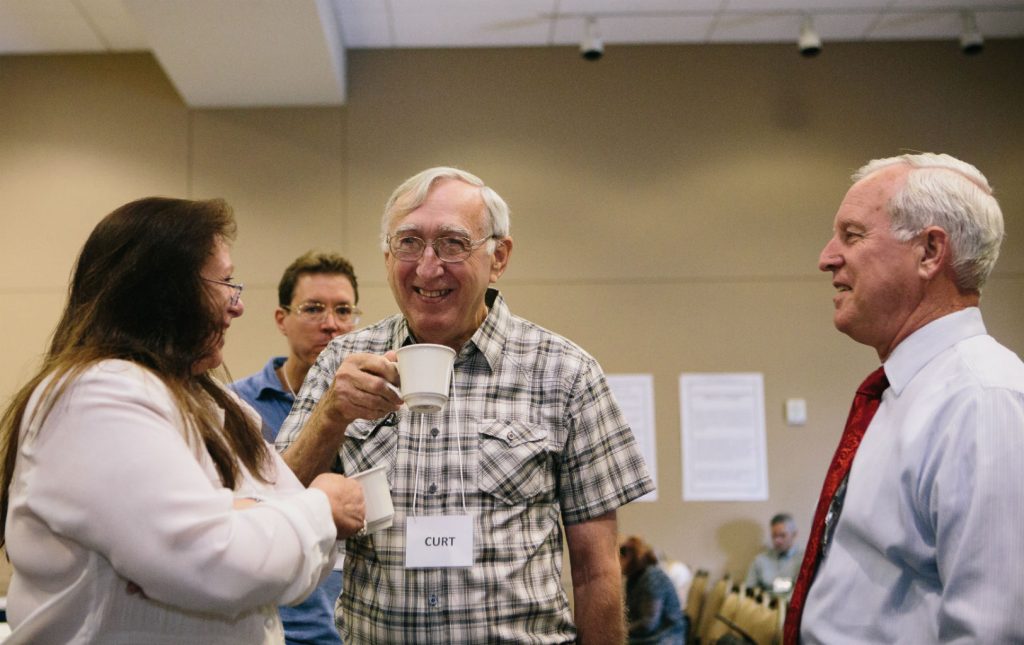If there’s one thing the Citizens Initiative Review – and democracy in general – depends on most, it is human interaction. And while we, as everyone, move enthusiastically toward expanding engagement through digital technologies, we here at Healthy Democracy are also going back to the basics. We are thinking about how to scale-up opportunities for the kind of constructive face-to-face decision-making that makes the CIR work.
Lately, in this quest, I’ve been reading Sherry Turkle’s Reclaiming Conversation: The Power of Talk in a Digital Age, her latest in a series of manifestos on the need to reinvest in the (as she sees it) languishing art of in-person communication.
We are substituting old-school conversation, she writes, with a much wider but thinner form of what she calls “connection” – texting when we used to call, emailing when we used to meet. Even if we are “connecting” with a greater number of people, we are actually interacting less. What’s more, Turkle argues, we are therefore depriving ourselves of an essential antidote to isolation (and cultural isolation), as well as an essential set of skills, those needed to navigate the often-messy world of real human interaction.
Paramount among these skills is empathy. This is not sympathy, or the ability for me to relate someone’s experience to one’s own, but empathy, the ability to step into someone’s shoes for a minute, to understand their motivations, values, and worldview on its own terms. And empathy is much more difficult to learn than we expect, writes Turkle, and takes repeated practice. It is not a matter of simply caring about someone’s view, but is a matter of, in a way, technical skill. It depends on accurately reading tone-of-voice and nonverbal cues; it depends on auditory comprehension; and it depends on each of us having the kind of personal self-esteem that allows us to step into another human being’s world of beliefs without the urge to defend our own.
Superficial forms of “connection,” Turkle says, do not build these skills.
Participants in Turkle’s own research talk about their genuine fear of face-to-face interaction and the loss of control they feel when presented with another human being in real time. In person, words cannot be thought through as thoroughly, people can sometimes be horribly boring, and, as one participant admits, conversations are simply “hard work.”
“Real people, with their unpredictable ways,” writes Turkle, “can seem difficult to contend with after one has spent a stretch in simulation.”
But we are also resilient animals, Turkle says, and it doesn’t take much to retrain ourselves. In one study, for example, children who attend only five days at a “device-free” summer camp “show an increased capacity for empathy as measured by their ability to identify the feelings of others by looking at photographs and videos of people’s faces.”
We can take Turkle’s theory on the pitfalls of superficial “connection,” however, and expand it to a societal level. National political “conversations” have never been empathetic, of course – we’re flattering ourselves when we think we’ve invented partisan rancor. (Recall beatings on Senate floor, FDR’s attempt at packing the Supreme Court, and the Civil War, for heaven’s sake.)
But the 24-hour news cycle, the troll-emboldening anonymity of online comment sections, and our political culture’s reliance on email, Facebook, and Twitter for constituent communication – these put an ever-greater distance between us and the world, between us and those with whom we disagree, and between us and our elected officials. Indeed, even in the decidedly anti-conversational world of electoral politics, think about the difference in (im)personality between a fireside chat and a campaign email, even between seeing a televised speech delivered to the camera and a quip delivered on Facebook or Twitter.
So what do we do?
Check out Part 2 for more on our most recent ideas for bringing dialogue back into democracy. But first, for more on Ms. Turkle’s research, take a peek at her 2012 TED Talk below:
Sherry Turkle’s 2012 TED Talk, “Connected, But Alone?” |


